#and to promote lgbtq rights in a space as homophobic as football often is? that takes courage
Explore tagged Tumblr posts
Note
the little rainbow armband 🥹 I'm so proud how manu stayed strong when everyone told him to drop the issue. he stands for lgbtq and I love him even more for it
Thinking about him again (rainbow armband Manu):
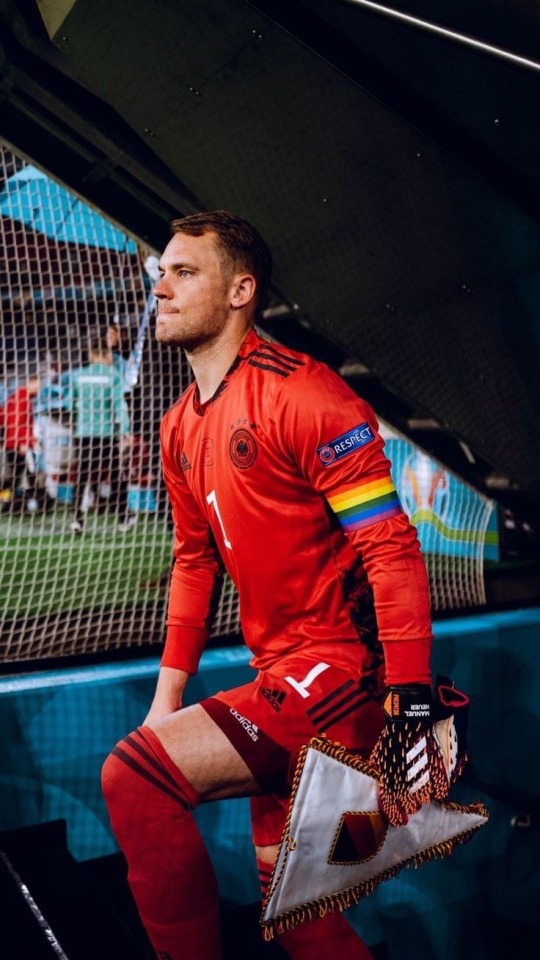

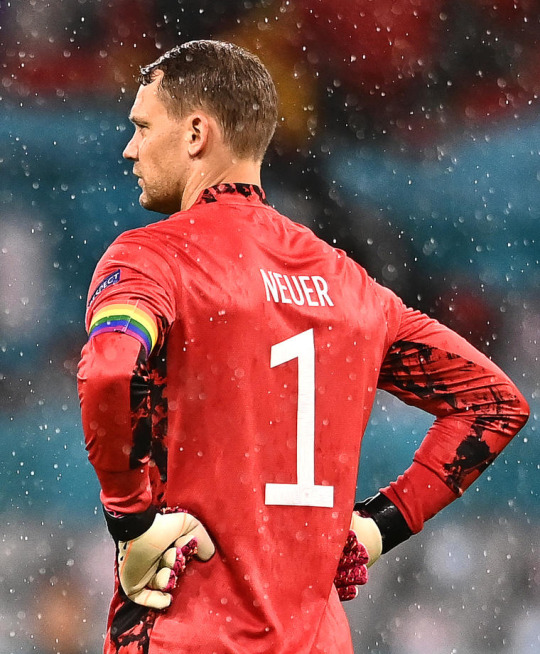
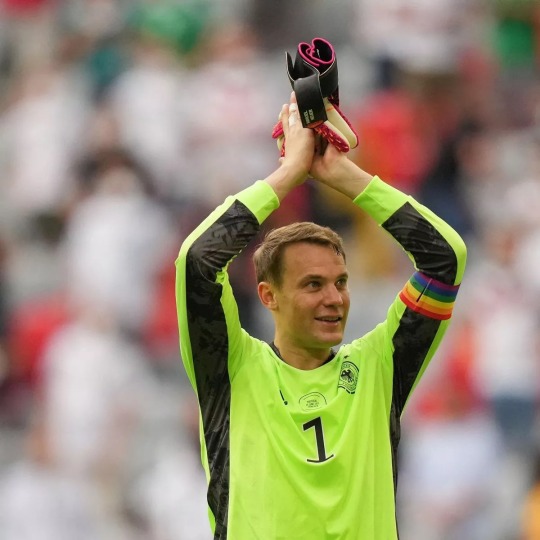
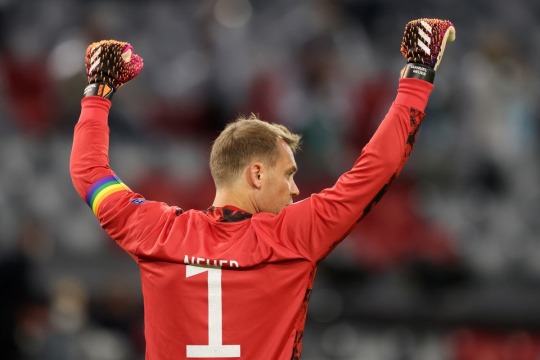
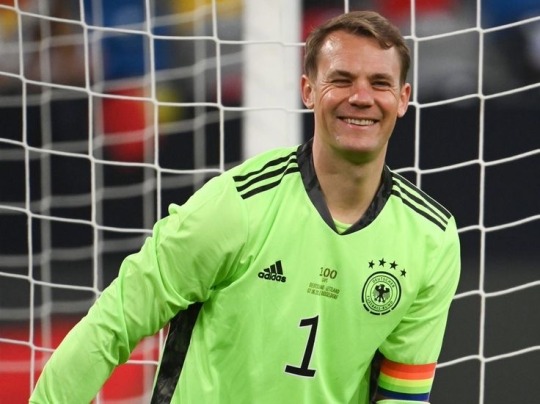
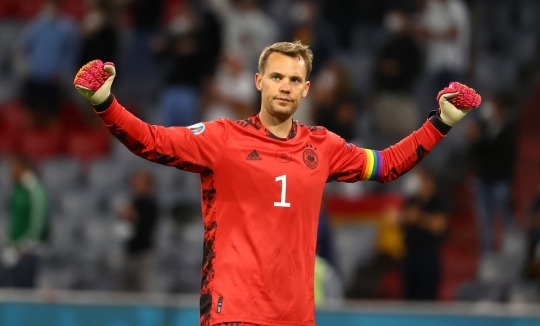
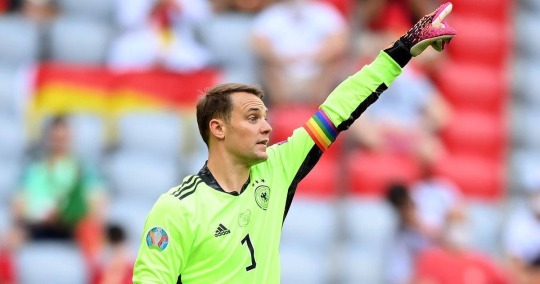
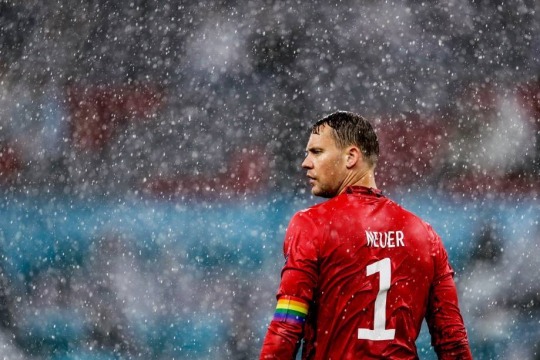



With that armband, he sent a clear message: he wants football to be a space where everyone is welcome. He showed that he’s the kind of captain the sport desperately needs—one who recognizes his influence and uses it for good. The idea that he felt so strongly about lgbtq rights that he was willing to go toe-to-toe with UEFA is everything. The people’s princess, truly
#anon 💖#seriously anon…you must’ve read my mind#I was just obsessing over this last night#I’d already respected him before he wore the rainbow armband…but this whole situation just made me love and respect him even more 🥹#it’s so clear to me why he’s captain#he’s a fighter#and to promote lgbtq rights in a space as homophobic as football often is? that takes courage#the kind of courage I wish more footballers had#manuel neuer#die mannschaft#dfb team#german nt#germany nt#my asks#compilations
14 notes
·
View notes
Text
Butch’, ‘dyke’, you name it… Why should female footballers face this ongoing derogatory labelling?
Women’s football is currently enjoying increased media coverage and an increase in wage for those playing in the blossoming professional Women’s Super League. But this hasn’t always been the case… Football for women was banished by the Football Association in 1921, deeming the game to be unsuitable for women. The Women’s Football Association was established in 1969 overturning the ban on women playing football. Now there being 1.2 million female football players in Europe. The question is, with this rise in popularity of women’s football and women’s sports now being described as a “safe sporting and social space for lesbians” by educators, why do results from a survey by Paddy Power and GAY TIMES suggest that 69% of participants believe that the FA should be doing more to prevent homophobia?
The image problem
Traditionally, females have been discouraged from participation in football by threats to their sense of themselves as ‘normal’ women, often protecting their identities. This idea of a normal woman was reinforced by Sepp Blatter in 2004 stating that women playing with a lighter ball creates a more “female aesthetic”. Does this signal the type of female footballer FIFA prefer? Femininity is foremost, often used as a code word for heterosexuality.
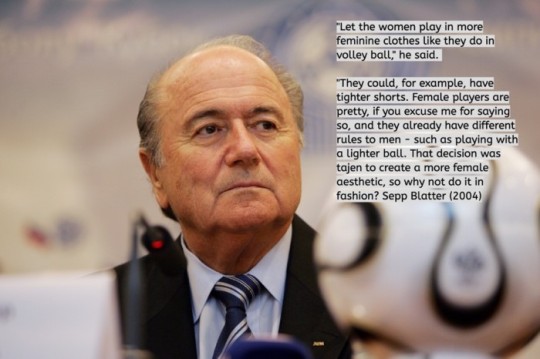
The emphasis on heterosexuality and femininity often perpetuates the myth that the LGBT community are dishonourable and that females should abide to Sepp Blatter by appearing and behaving in feminine ways. The Stonewall Chief Executive summarises the issue as “reverse homophobia” - “If a woman is unusually good at something [such as a sport] she must be a lesbian…if a man is gay, he can’t possibly be good at sport because he’s not masculine enough.”
Magdalena Eriksson, Chelsea and Sweden International describes her experience as coming out as accepting, but states “I wouldn’t have got the same reaction if I didn’t have long blonde hair”. Her fellow international teammate Nilla Fischer however had a harsh response, with attracting a large amount of abuse for being openly gay and having a more masculine presentation. Why should women have to protect and hide their lesbian image?
Commentators of women in sport have noted how various strategies are employed by female athletes to emphasize their heterosexuality and disassociate themselves from the lesbian label. Lou Englefield, director of Pride Sports and campaign director of FootballvHomophobia confirms this in her experience of coaching girls, “I saw on many occasions teenage girls being called names by teenage boys: ‘Oh you’re a man because you want to play football’. Words like manly and butch were thrown around. The policing of gender and policing of women happens from a really young age. And in reality, the reason girls gave up football was because of gender stereotypes. They didn’t want to be seen as butch or athletic or masculine because they wanted boys to fancy them.”
The Homophobia Problem
Homophobia is ultimately still thriving in society, especially on social media platforms. Andre Gray used the hashtags “burn”, “die” and “makes me sick” when addressing homosexuality. A Manchester United supporter claimed on twitter that Manchester United supporting stonewall, a charity to help tackle such issues that still exist within society and the LGBT community, “endorses immortality.”

Shockingly, at a Proud Canaries event which is an event held annually at Norwich City, when the LGBT Proud Canaries were doing a lap of honour a supporter exclaimed "don't clap them, shoot them".
Stonewall found that 43% of the LGBT community believe that public sporting events aren’t a welcoming space for themselves. New initiatives have been created to abolish this 43% figure such as the Stonewall Rainbow Laces campaign and the FootballvHomphobia Campaign. But most recently we have seen the Lesbian Visibility Week, a week targeted at LGBTQ+ women, to unite and support lesbians in all domains. The DIVA Media Group who created the national campaign, aim to “celebrate lesbians and show solidarity with all women in our community”. In April 2020, Sky Sports report on this fantastic campaign stating, “All this week, Sky Sports has been sharing stories to mark the first-ever Lesbian Visibility Week, a new awareness initiative celebrating women-loving women in the LGBT+ community.” Sounds great, finally a breakthrough to support females on their inclusion journey. But is this actually the first ever Lesbian Visibility Week?

Females in football are supposed to find their pride, but how is this possible when a British subscription television channel have missed this Lesbian Visibility day for the past 12 years?
Time for Change?
Pride in Football, an umbrella organisation that helps 46 affiliated groups focusing on improvements in areas, is helping to make a change. Aspects include Steward Training, Incident Reporting and Signage as well as generally promoting the visibility of their clubs’ LGBT fan-base via Banners displayed at grounds or club presence on Pride Parades.
Gilly Flaherty, West Ham Women’s Captain, stated on BBC Three documentary Britain’s Youngest Football Boss; “we get quite a lot of openly gay football players, but I think we get quite a lot of openly gay female fans as well, it's just seen as like... it's just very inclusive.” This adds to the 37% of heterosexual football fans think that football is becoming a safer social space for players to come out as LGBTQ+. Are times changing? Since 2014 when England female football captain Casey Stoney came out as lesbian stating that “being gay isn’t a choice, it’s something that just happens”. It was an ultimate moment for lesbians in football. Contrary to her being “frightened of being judged, frightened of what other people might say.”, this was soon diminished through the support of her team, but also the women’s football community.
youtube
The homophobia of football reinforces this homosociable functioning of the teams, promoting the meeting of potential partners in a ‘secure’ place. Danielle van de Donk and Beth Mead are a prime example of the meeting of potential partners with the two Arsenal teammates having chemistry both on and off the pitch since 2017. Love can also end up in yellow cards when it comes down to challenges, in 2019 Danielle drove at the referee after her girlfriend Beth was tackled hard by Stringer.
youtube
Stepping into the mainstream for lesbian women footballers can be increasingly dangerous with fears of women’s football mirroring that of the men’s game. Educating fans and generally just those involved in sport is what Eric Najib, a former player and now manager of Stonewall FC, stated to enable a change in people's perceptions. A starting point could begin by pointing out the homophobic behaviour that exists within women’s football, to demonstrate that this exists on many levels of the game from grassroots right through to the Women’s Super League. The Football Association needs to shift this atmosphere in a positive direction both on and off the field to raise visibility by publicising LGBTQ+ events, forming partnerships or providing funding for teams.
As stated by Aneesha Dewshi, founding member of Romance FC, “It’s really important to listen to the LGBTQIA+ community and let them share their experiences, so you can empathise and understand. Educate yourselves on the history of Pride, the marches, the movement, and the struggle for basic human rights. If you ever hear any homophobic abuse, stand up and call it out.”
N0779476
References
Crosset, T. W. (1995). Outsiders in the clubhouse: The world of women's professional golf. Sunday Press.
Halbert, C. (1997). Tough enough and woman enough: Stereotypes, discrimination, and impression management among women professional boxers. Journal of Sport and Social Issues, 21(1), 7-36. doi: 10.1177/019372397021001002
Hargreaves, J., & Females, S. (1994). Critical issues in the history and sociology of women’s sports.
Harris, J. (2005). The image problem in women’s football. Journal of Sport and Social Issues, 29(2), 184-197. doi: 10.1177/0193723504273120
Pfister, G. (2015). Assessing the sociology of sport: On women and football. International Review for the Sociology of Sport, 50(4-5), 563-569. doi: 10.1177/1012690214566646
7 notes
·
View notes